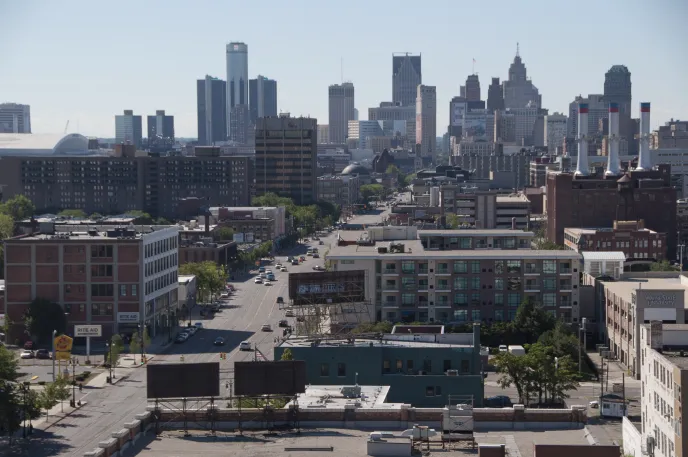Wayne State Humanities Clinic

Image courtesy of Wayne State University.
How can humanists help to solve complex problems like a lack of access to food and clean water or racial and economic disparity in health care during a pandemic? The Wayne State Humanities Clinic, an innovative graduate internship program at Wayne State University in Detroit, puts the humanities front and center when it comes to tackling problems like these. As coordinator of the Humanities Clinic, and a PhD candidate in history, I build community partnerships with Detroit nonprofits and businesses and match them with humanities and social science graduate students for summer internships.
The interns’ diverse academic backgrounds allow them to not only collaborate with community partners but also work with one another in interdisciplinary teams on specific projects. This summer, students from history, anthropology, and psychology are working with doctors and community organizers at Karmanos Cancer Institute to study how cancer prevention and treatment has been impacted by COVID-19. Another team of students from anthropology, social work, English, and classical and modern languages are collecting and analyzing data for Detroit Water Stories, a multimedia project that examines how water shut-offs have impacted Detroit residents. Another team of interns are applying their teaching and research experience to encourage cultural humility among doctors at Henry Ford Health System, and other interns are using their GIS-mapping skills to help Food Rescue US-Detroit distribute food to neighborhoods that lack grocery stores.
As part of their work, interns gain self-confidence and experiential knowledge as they apply academic skills like writing, editing, archival research, and data analysis to projects beyond the academy. Projects span a variety of areas, such as grant writing for nonprofits, exhibition and educational program design at museums and libraries, and patient and client advocacy at hospitals and legal clinics. These skills and experiences help prepare graduate students for a wide range of careers. The Clinic also adapted to run entirely remotely to prevent the spread of COVID-19 and prepare graduate students for the future of work as it shifts due to health concerns and technological advances.
The impact of these internships goes beyond the interns themselves. As Detroit undergoes a revitalization, new businesses, sports stadiums, and improvements to existing museums, cultural organizations, and hospitals have changed the downtown landscape. Yet Detroit remains the poorest “big city” in the United States with 40% of its residents living in poverty. In an effort to bring positive change to Detroit’s most vulnerable populations, especially during the pandemic, the Clinic recently doubled its efforts by hiring 23 interns to work with 25 non-profits and small businesses that serve Detroit communities. By bringing humanities and social science expertise to these communities, interns bring a fresh perspective and new ways of thinking about the challenges and issues facing nonprofits and businesses in Detroit.
As the Humanities Clinic grows, it continues to demonstrate how community partnerships and interdisciplinary collaborations can prepare the next generation of humanists for diverse careers. Moreover, the Clinic highlights how humanists can harness their academic training to meet challenges and opportunities in Detroit and beyond.
Lillian Wilson is a PhD candidate in US history and gender at Wayne State University, coordinator of the Wayne State Humanities Clinic, and an American Historical Association Career Diversity Fellow. Her past professional experience includes work for education, volunteer, and community outreach programs at the Smithsonian Institution, the Phillips Collection, and the Detroit Historical Museum.
Learn how to contribute to the Humanities for All blog here.
We partnered with the Humanities Clinic to survey the summer 2020 interns and assess the impact of participating in the innovative program. Read more about the survey results on the National Humanities Alliance blog.